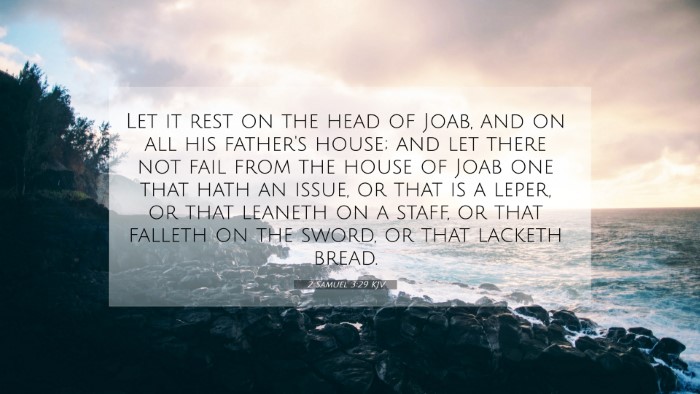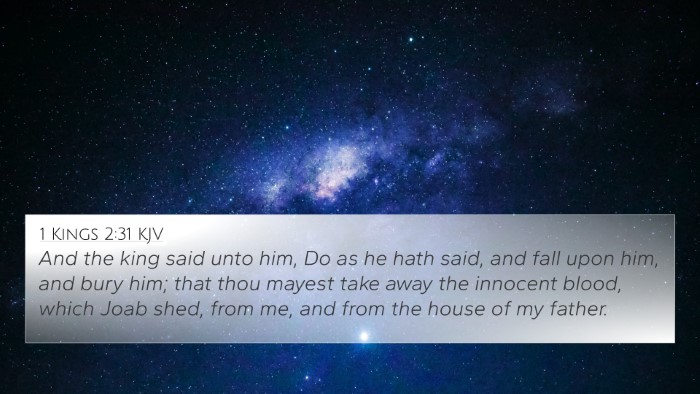Understanding 2 Samuel 3:29
Bible Verse: 2 Samuel 3:29
This verse highlights the grave consequences of treachery, specifically considering the actions of Joab in the context of Abner's death.
Cross-References
- Numbers 35:33-34: Discusses the sanctity of blood and the land's defilement through murder.
- Proverbs 16:29: Speaks to the deceitfulness and wickedness of those who lead others into harm.
- Romans 6:23: Emphasizes the deadly wages of sin, applicable in understanding the moral implications of Joab's actions.
- Matthew 26:24: Illustrates the concept of betrayal, paralleling the importance of loyalty.
- 1 Kings 2:5: Details the consequences Joab faced for his treachery later on, linking thematic continuity through scripture.
- Galatians 6:7: Warns about reaping what one sows, relevant in the moral framework of Joab's betrayal.
- Psalm 55:12-14: Reflects on betrayal among friends, echoing the themes found in 2 Samuel 3:29.
Commentary Insights
The verse states, "Let it rest upon the head of Joab, and upon all his father's house." This phrase underlines the severe repercussions of Joab's actions, suggesting that responsibility for this act of violence and rebellion will not only fall on Joab but will extend to his lineage. Various commentaries provide valuable insights into the complexities of this situation:
Matthew Henry's Commentary
Matthew Henry asserts that the curse invoked upon Joab's house indicates the dire consequences of his choices. He elaborates on the notion of bloodguiltiness—the idea that taking a life brings a weighty burden upon the perpetrator and their descendants.
Albert Barnes' Notes
Barnes elucidates that the actions of Joab were seen as treachery not just against Abner but against the unity and peace of Israel itself. He emphasizes that the conflict between the houses of David and Saul represents a larger struggle for sovereignty, which Joab undermined through his personal vendetta.
Adam Clarke's Commentary
Clarke provides an interpretation that brings out the broader implications of such actions within the context of social and divine order. He also notes the tragic irony of Joab's betrayal, which ultimately leads to his own demise, showcasing the inevitable consequences of sin.
Thematic Connections
This verse can be understood better when examined in relation to broader biblical themes, such as treachery and its outcomes, the sanctity of life, and divine justice. Understanding treachery within the context of biblical teachings helps us appreciate the gravity of betrayal portrayed throughout scripture.
Exploring Accountability in Relationships
It is crucial to explore how this verse forms a part of the larger narrative about accountability. Joab's actions serve as a warning about the dangers of personal ambition, illustrating how personal gain can lead to broader social disputes and violence.
Inter-Biblical Dialogue
The implications of 2 Samuel 3:29 resonate with various biblical texts, encouraging much reflection on the bonds and responsibilities that exist among individuals within a society. A few notable connections include:
- Genesis 4:10-11: The curse of Cain for the murder of Abel highlights the serious ramifications of killing.
- Exodus 20:13: The commandment against murder underscores the moral offense of Joab's action.
- Matthew 5:21-22: Jesus's teaching on anger and its connection to murder deepens the understanding of underlying motives.
Tools for Bible Cross-Referencing
Utilizing various tools can facilitate comprehension and provide deeper insights into 2 Samuel 3:29 and its interconnections:
- Using a Bible concordance for thematic searches related to treachery.
- A Bible cross-reference guide can help identify adjacent scripture relationships.
- Cross-reference Bible study methods can clarify Morality inside narratives.
Conclusion
2 Samuel 3:29 serves as a stark reminder of the seriousness of treachery and its consequences both in personal lives and the broader community. By employing theological understanding reached through public domain commentaries and cross-referencing with other significant verses, one gains a more profound comprehension of Biblical themes regarding loyalty, accountability, and divine justice.














